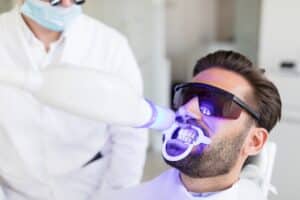Dental emergencies can strike any moment, leaving you in excruciating pain and discomfort. From a chipped tooth to a severe abscess, these unexpected situations require quick thinking and immediate action. But don’t panic just yet! In this blog post, we’ve compiled the top tips for coping with dental emergencies so that you can stay calm and collected when faced with a dental crisis. So whether you’re dealing with an unbearable toothache or a broken crown, we’ve got your back! So grab a cup of tea (or maybe some ice chips) and read on to learn how to handle any dental emergency like a pro.
Dental emergencies can be stressful and overwhelming. If you are facing a dental crisis, here are some top tips for coping:
1. Seek professional help immediately. If you have a dental emergency, it is essential to seek professional help as soon as possible. Depending on the severity of your emergency, you may need to see a dentist or an oral surgeon.
2. Be prepared. It is always a good idea to be ready for a dental emergency by knowing who to call and how to get to the dentist quickly. Please keep the number of your dentist or oral surgeon handy in case you need it.
3. Take care of yourself. In the meantime, while you are waiting for professional help, there are some things you can do to take care of yourself and your teeth. If you have a toothache, rinse your mouth with warm water and take over-the-counter pain medication. If you have knocked out a tooth, try to find the tooth and bring it with you to the dentist. Rinse any dirt off the tooth with water but do not scrub it or handle it too much, as this could damage the tooth root. If bleeding is present, apply firm pressure with a clean cloth or gauze pad until the bleeding stops.
4. Stay calm. Dental emergencies can be scary, but staying calm and following these tips is essential until professional help arrives!
Common Types of Dental Emergencies
There are many different types of dental emergencies, but some of the most common include the following:
Toothaches: A toothache is usually caused by an infection or inflammation in the tooth. It can be harrowing and should be seen by a dentist as soon as possible.
Knocked-out teeth: If you have a tooth that has been knocked out, it’s essential to try to find the tooth and bring it to the dentist. The tooth can be re-implanted if a dentist sees it within a few hours.-Broken teeth: A broken tooth can be caused by an injury or from biting down on something hard. If you have a fractured tooth, it’s essential to see a dentist right away so that they can determine if the tooth can be saved or if it will need to be extracted.
Abscessed teeth: An abscessed tooth has become infected. It can cause severe pain and swelling and should be treated by a dentist immediately.
What to do in a Dental Emergency
If you have a dental emergency, the first thing you should do is call your dentist. If you can’t reach your dentist, visit the nearest emergency room.
If you have a toothache, rinse your mouth with warm water and take over-the-counter pain relievers. You can also put a cold compress on your cheek to ease the pain.
If you have knocked out a tooth, try to find the tooth and bring it with you to the dentist. Rinse the tooth off gently with water if it’s dirty. If possible, try to reinsert the tooth in its socket. Otherwise, put the tooth in a cup of milk or saline solution.
If you have bitten your tongue or lip, clean the area with warm water and apply a cold compress. Call your dentist if the bleeding doesn’t stop after 15 minutes or is accompanied by severe pain.
If you have an object stuck between your teeth, try to remove it with floss. Never use a sharp object like a pin or needle to remove something from your teeth.
How to Find Relief from Pain
When you’re in pain, the last thing you want to do is wait around for relief. So here are some tips on how to find relief from pain fast:
1. Take over-the-counter pain medication. Ibuprofen and acetaminophen are both effective at reducing pain. Be sure to follow the directions on the package so that you don’t take too much and end up with unwanted side effects.
2. Apply a cold compress to the area of pain. It can help reduce inflammation and numb the area, providing temporary relief.
3. See your dentist as soon as possible. Many dental problems can be quickly and easily treated, so it’s essential to get professional help as soon as possible. It is especially true if you’re experiencing severe pain or have an infection.
Tips for Managing the Stress of a Dental Emergency
When you have a dental emergency, the last thing you want to do is panic. But it’s essential to remain calm and take some basic steps to get the treatment you need as quickly as possible. Here are some tips for managing the stress of a dental emergency:
1. First and foremost, call your dentist right away. If you don’t have a regular dentist, find one that offers emergency dental care.
2. Take over-the-counter pain medication to help manage pain and inflammation.
3. Rinse your mouth with warm water if bleeding or if there is an open wound. You can also use a cold compress to reduce swelling.
4. If you have knocked out a tooth, try to find the tooth and bring it with you to the dentist (if possible). If you can’t find it, don’t worry – your dentist can usually replace the tooth.
5. Be sure to follow any instructions from your dentist and keep all appointments for further treatment or follow-up care.
Home Remedies and Natural Alternatives for Treating Pain
There are several home remedies and natural alternatives for treating pain that can be effective in managing dental emergencies. Some simple home remedies for treating pain include:
- Applying a cold compress to the affected area to help reduce swelling and pain
- Taking over-the-counter pain medication such as ibuprofen or acetaminophen
- Rinsing the mouth with a saltwater solution to help relieve pain and inflammation
- Using a topical numbing agent such as lidocaine to relieve pain temporarily
- If you are experiencing severe pain, seeking medical attention from your dentist or doctor is essential. They can provide you with more specific and targeted treatment options.
Other Considerations During a Dental Emergency
When you are experiencing a dental emergency, there are a few other things to remember besides the tips already mentioned:
- Try to stay calm. It can be difficult when you are in pain, but it will help you think more clearly and make better decisions.
- If you can, call your dentist and explain what is happening. They can guide you on what to do next or even see you immediately if they have an opening.
- If you must go to the emergency room, tell the staff, you are experiencing a dental emergency so they can triage you appropriately.
Conclusion
Dental emergencies can be frightening and uncomfortable, but with the proper knowledge and preparation, you can ensure that your oral health is taken care of in an emergency. We hope our tips have helped you learn how to cope with dental emergencies so that you feel more prepared if one occurs. Remember, it’s important to see a dentist as soon as possible when dealing with any dental emergency; don’t wait until it gets worse!





